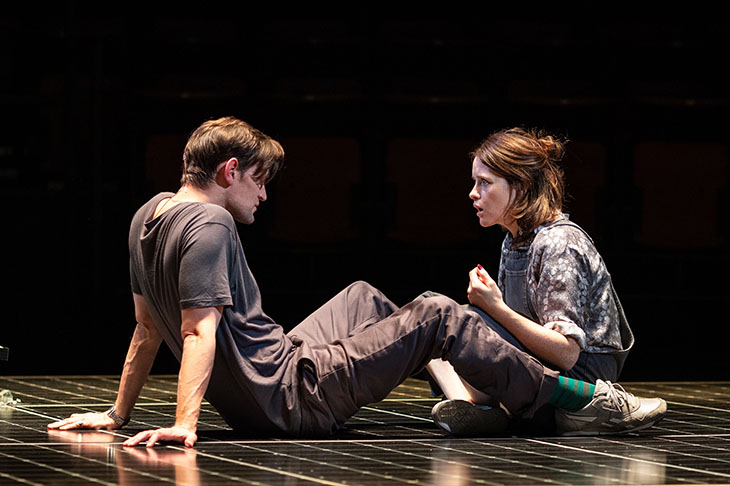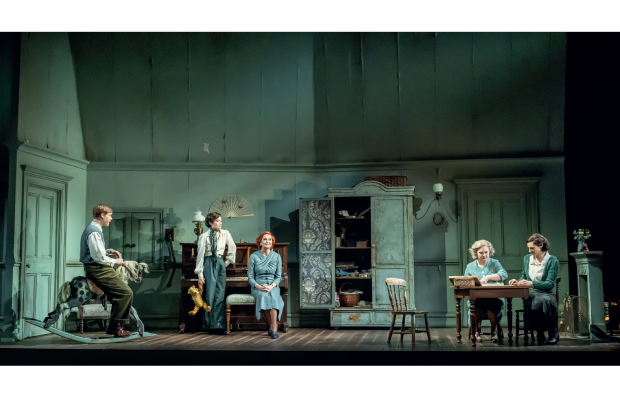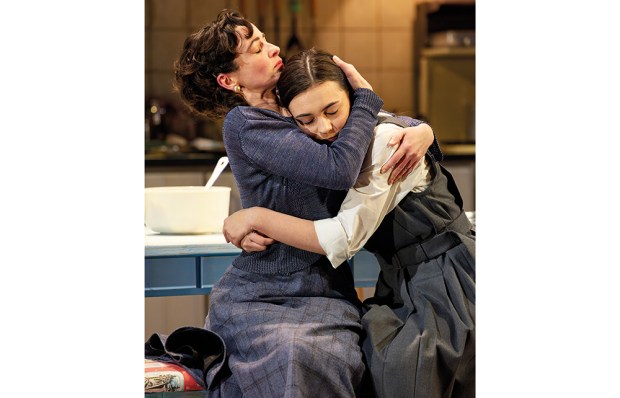No power on earth can stop Lungs from becoming an international hit. Duncan Macmillan’s slick two-handed comedy reunites Matt Smith and Claire Foy from The Crown. It’s short (90 mins), it has a minimalist set (‘arty’), and it makes no intellectual demands on the crowd (phew!). Best of all, it parrots all the ecological prejudices currently supported by today’s urban bourgeoisie.
Matt and Claire play a broody couple who fear that having a child will destroy the planet and kill billions of their fellow earthlings. Their voluble anxieties persist for 40 minutes and become a little tiresome for those blessed with long memories. Older play-goers, like me, know that every climate scare offered to us in the past 45 years has turned out to be bogus, including the notorious ‘reglaciation’ threat announced in Time magazine, 24 June, 1974: ‘Another Ice Age?’ But Matt and Claire are confident that the Earth is about to be consumed by toxic air, expiring forests and scorching temperatures, and that every inch of occupied land will soon be swamped by rising seas.
However, like most eco-activists, they consider themselves exempt from the sacrifices they want imposed on everyone else. ‘We’re good people,’ they say, meaning that they recycle, they monitor their carbon footprint and they watch subtitled films. They distinguish themselves from ‘thoughtless people’ (‘the lower orders’ as they were once called) who breed without a care for the planet’s future. Matt goes one further and suggests that giving birth should be licensed by the state, like the ownership of a car or a shotgun.
All these issues are articulated in amusing, quickfire dialogue which carries a strong element of self-parody. We’re invited to enjoy Matt’s authoritarian distaste for the poor without feeling that he genuinely believes his own rhetoric. Eventually the pair decide to copy the ‘thoughtless people’ they claim to despise. They will have a child. And sod the planet. But things go wrong and their lives are twisted out of shape in ways that make the script much more satisfying and complex in the second half.
Finally we fast-forward 50 years and revisit the couple in old age. Yes, old age. They survive. The world in 2069 is just as habitable as it is today, and all the global disasters currently under discussion have failed to materialise. This is the show’s best moment. But the playwright is reluctant to accuse Extinction Rebellion of peddling manipulative falsehoods. That would harm the box office. And this play is, if nothing else, a superb commercial proposition.
Here’s what happens next. Matt and Claire will accept oodles of cash to take the show to Broadway for three months. Once the sell-out run has finished, they’ll be replaced by two handsome new Brits — perhaps a Downton skivvy and a Poldark yokel — who will continue the show for a year or two. Meanwhile, spin-off productions will embark on parallel tours of North America, Australia, South Africa and so on. And a UK version will do the rounds of Britain’s market towns and provincial centres. And that’s where the minimalist set will come in handy. Touring is joyously cheap if the actors and the stage kit can be squeezed into a Transit van. The final masterstroke is the publicity. This will be spearheaded by the greatest Bond villain never to appear in a Bond move: Greta Thunberg. She works for free of course. The thing is an act of consummate genius.
Botticelli in the Fire, set in 15th-century Florence, presents us with Sandro Botticelli as a camp, preening bisexual ‘art star’. The script is chock full of grating anachronisms. ‘What time is it?’ says Lorenzo de’ Medici’s wife. ‘I need a shower.’ Botticelli has a boyfriend, young Leonardo, played by an Asian in a pair of spectacles. It soon becomes clear that these aren’t blunders but a deliberate attempt to fuse the Renaissance with modern life.
And it works, in a way, to turn the revered masters of the quattrocento into flesh-and-blood humans who swear and pout and boast and weep. Yet the emotional atmosphere owes much to the 1980s when gay men were a defiant minority threatened by persecution. And the soft-porn sex scenes feel a little tame and retro as well. Botticelli faces trouble from two directions. A homophobic hate-preacher, Savonarola, wants to torch gays on public bonfires. And his patron, Lorenzo de’ Medici, keeps dropping into the studio to chuck Dulux over his latest masterpiece. Neither of these malignant characters is anything more than a shouty thug. The finest performance comes from Sirine Saba who plays Lorenzo’s wife and delivers a wickedly funny cameo as Aphrodite whom she turns into a bored Slovenian stripper. I wonder if the Hampstead Theatre’s previous boss, Ed Hall, would have lavished the theatre’s vast resources on this gaudy, bawdy trifle. Probably not.
Got something to add? Join the discussion and comment below.
Get 10 issues for just $10
Subscribe to The Spectator Australia today for the next 10 magazine issues, plus full online access, for just $10.
You might disagree with half of it, but you’ll enjoy reading all of it. Try your first month for free, then just $2 a week for the remainder of your first year.














Comments
Don't miss out
Join the conversation with other Spectator Australia readers. Subscribe to leave a comment.
SUBSCRIBEAlready a subscriber? Log in